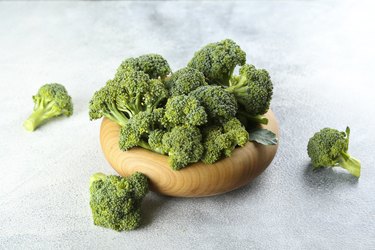
While broccoli may get a bad rap for being the enemy on kids' dinner plates everywhere, the cruciferous veggie is a nutritional powerhouse, packed with vitamins, antioxidants and anticarcinogenic compounds. But for all of its health benefits, there's one downside: broccoli gas.
Some Broccoli Basics
Video of the Day
Broccoli is a cruciferous vegetable, as are its close relatives Brussels sprouts, cauliflower and cabbage. They also all have impressive nutritional profiles. For example, broccoli is packed with vitamin C, potassium, B6, folate, vitamin K and vitamin A, in addition to other antioxidants and phytochemicals, says Jesse P. Houghton, MD, senior medical director of gastroenterology at the Southern Ohio Medical Center.
Video of the Day
Plus, you can eat whichever part of the veggie you want. An analysis of the phytonutrients in broccoli, published in the journal Molecules in April 2018, confirmed that benefits can be garnered not just from the florets, but the leaves and stems, too.
When you chow down, however, you may find that eating broccoli can make you gassy. The reason for that, according to Dr. Houghton, is twofold. "It's due to both its fiber content — which can reach the colon and be acted upon by the bacteria in our body, thus giving off gas — along with one of its carbohydrates, raffinose," he says. "Our bodies don't have the necessary enzyme to break down this trisaccharide."
And like many other foods known to cause gas, it's not the broccoli itself that's exclusively causing you to have a case of flatulence. Rather, it's the bacteria working overtime in your digestive tract. High fiber content means that more food travels undigested to the colon — and, according to Dr. Houghton, the lower intestine to a lesser extent — to be worked through by bacteria. This process results in the production of nitrogen, methane and carbon dioxide.
Preventing Broccoli Gas
Although the human body doesn't produce alpha-galactosidase, an enzyme that breaks down raffinose, there is an over-the-counter medication that can help. "Alpha-galactosidase is the active ingredient in Beano, which can be taken before eating a meal containing cruciferous vegetables," says Dr. Houghton
Keep in mind, of course, that it's totally OK if you don't pack Beano in your purse or briefcase and wind up with a plate of broccoli and that distended feeling. "Take something with simethicone, such as Gas-X or Phazyme, which helps to break down the gas bubbles themselves," recommends Dr. Houghton.
But if you'd prefer to steer clear of the drugstore, you can take steps to prevent broccoli gas simply in terms of what you put on your plate. "Eat small portions [of broccoli]," says Dr. Houghton. "Don't gorge on broccoli at any one sitting." He also recommends thoroughly chewing food before swallowing to help break it down as much as possible before digestion.
"You can also cook broccoli to make it easier for your body to break down," says Dr. Houghton. "However, cooking it will cause you to sacrifice some of the plant's important phytonutrients."
A March 2019 study in Heliyon looked at this in detail, examining how cooking broccoli affected its levels of flavonoids, a type of antioxidant. The researchers found mixed results, depending on how you prepare the veggie: Boiling led to a "significant loss" of flavonoid retention, whereas microwaving and steaming led to only minor losses, and in some cases even an increase in flavonoids.
The Bottom Line on Broccoli
Broccoli has a slew of benefits, but broccoli gas is all too real for those who are fans of the cruciferous veggie. Thankfully, there are ways to both remedy and avoid it.
Read more: Nutrition Value of Steamed Broccoli
- Molecules: "Comparative Phytonutrients Analysis of Broccoli By-Products: The Potentials for Broccoli By-Product Utilization"
- Heliyon: "Effects of Domestic Cooking on Flavonoids in Broccoli and Calculation of Retention Factors"
- Jesse P. Houghton, MD, senior medical director of gastroenterology, Southern Ohio Medical Center, Portsmouth, Ohio
Is this an emergency? If you are experiencing serious medical symptoms, please see the National Library of Medicine’s list of signs you need emergency medical attention or call 911.